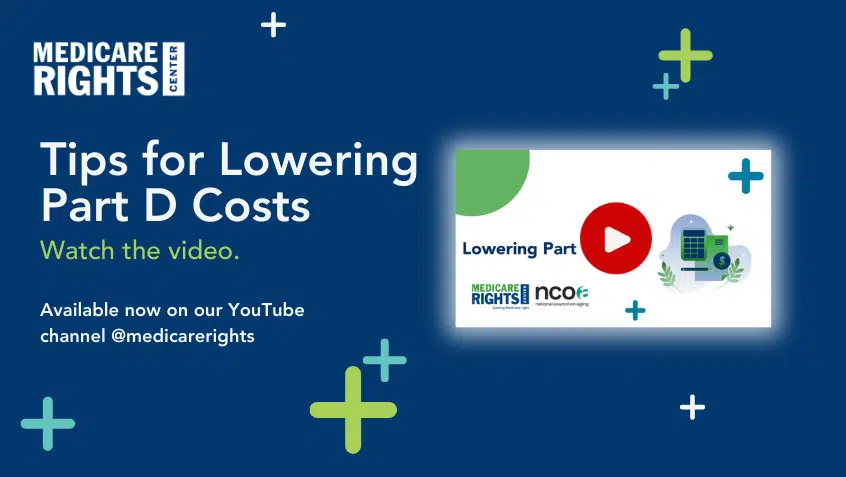Join Us Live for a Discussion on Medicare, Democracy, and the Future of Health Care
Proposed Rule Would Improve Clarity and Transparency in Medicare Advantage, Boost Access to Care

Last week, the Medicare Rights Center submitted comments on a proposed rule that would increase awareness of and access to Medicare Advantage (MA) supplemental benefits, make the connections between Medicare and Medicaid stronger for those who are dually eligible for both programs, require evaluations of plan prior authorization patterns, and begin to realign broker incentives with beneficiary interests.
Every year, the Centers for Medicare & Medicaid Services (CMS) proposes rules that change how MA and Part D plans operate. In some years, the proposals include major changes, while other years see more minor tweaks to the programs.
The proposed rule for 2025 falls into the latter category. In our comments, Medicare Rights welcomed the small but important steps the proposals represent, while urging CMS to do more to prioritize beneficiary health and well-being. For example, if finalized, the rule would require MA plans to send annual notices to enrollees if they may be eligible for supplemental benefits they have not already accessed. Such a notice could remind enrollees about the benefits and give important information about what they need to do to take advantage of the items or services. We urged CMS to move forward with this proposal and to make the notices more frequent and actionable to improve their efficacy. We know from past analysis that many people choose MA because of the potential for supplemental benefits, which makes it vital that those enrollees get the benefits they thought they were getting.
Another proposal would require some Dual-Eligible Special Needs Plans (D-SNPs), a special kind of MA plan solely for people who have both Medicare and Medicaid, to do a better job of tying together their respective service areas and bolstering plan integration. We raised some concerns about ways these proposals might interfere with access to care and encouraged CMS to continue to prioritize the beneficiary experience.
An additional proposal would require all MA plans to conduct a health-equity analysis of how people in some groups are affected by prior authorization that may deny or delay care, and how those patterns differ, if at all, with the care received by people not in those groups. The proposal would also require plans to publish this analysis so that enrollees, providers, and the public can better see the impact of prior authorization on each category of enrollee and beneficiaries as a whole. We strongly supported this proposal and urged CMS to require the analysis to include people with a wider range of backgrounds and experiences.
Another important proposal would limit how much commission brokers and agents receive to sell MA plans. Currently, brokers and agents have a cap on their commissions for both MA plans with Part D prescription drug coverage and standalone Part D plans; for 2023, the caps were $601 for each MA initial enrollment and $92 for each Part D initial enrollment. As these numbers show, the commissions are much higher for MA than Part D. In practice, they are even higher as many MA plans skirt these rules and pay brokers additional “administrative” fees, which they claim are necessary to cover certain broker expenses. The proposed rule would bump up the commission level somewhat and eliminate these administrative fees to better level the playing field between smaller MA plans, larger MA plans, and standalone Part D plans. While we strongly support closing this loophole, we urged CMS to do much more to bring MA commissions into alignment with those for Part D to avoid the current incentive to sell MA plans even when they are not the best option for individuals.
In all, we were supportive of most of the ideas in the proposed rule and hope CMS will consider our suggestions in finalizing these important policies.
Read the proposed rule and fact sheet.
Show Comments
We welcome thoughtful, respectful discussion on our website. To maintain a safe and constructive environment, comments that include profanity or violent, threatening language will be hidden. We may ban commentors who repeatedly cross these guidelines.
Help Us Protect & Strengthen Medicare
Donate today and make a lasting impact
More than 67 million people rely on Medicare—but many still face barriers to the care they need. With your support, we provide free, unbiased help to people navigating Medicare and work across the country with federal and state advocates to protect Medicare’s future and address the needs of those it serves.
The Latest
Most Read
Add Medicare to Your Inbox
Sign up to receive Medicare news, policy developments, and other useful updates from the Medicare Rights.
View this profile on InstagramMedicare Rights Center (@medicarerights) • Instagram photos and videos









